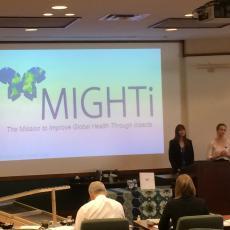







Valerie Stull, a PhD student in the Nelson Institute's Environment and Resources program, and Rachel Bergmans, a PhD student in Epidemiology at the School of Medicine and Public Health, who call their project MIGHTi, were announced the winners last week of the Climate Quest competition hosted by UW-Madison's Office of Sustainability in partnership with a number of different campus organizations.
The competition was open to anyone, UW affiliated or not, who could come up with a practical solution to climate change, and then present their idea in front of a panel of distinguished judges.
Stull and Bergmans proposed farming mealworms, the high-protein larvae of the dark wing beetle. They plan to begin their work in Zambia, an impoverished country in southern Africa where malnourishment is widespread. People in Zambia already commonly eat insects harvested from the wild, so the idea of insect farming does not require the same paradigm shift that it does here in the U.S.
“Whenever I tell people about this project, they kind of make a face at first,” Stull said. “But when we talk about all the benefits of eating insects, they start to get interested. And then when I ask them, well 'would you be willing to drink a smoothie with insect protein powder?' Most people say yes.”
A prototype is in the works right now, according to Stull. The model presented at the Climate Quest competition had dimensions of just a few feet, so it can easily be stored inside a home. Moreover, mealworms are a food source that cost very little to maintain, and have a low environmental impact.
“It's very elegant, and it's a little weird,” said Craig Benson, Wisconsin Distinguished Professor of Civil and Environmental Engineering and Geological Engineering, and one of five judges for the Climate Quest competition. “When I first heard it I thought 'this is a crazy idea.'”
But Benson said that as he continued to ponder the concept, he began to see it as a project with huge potential for positive global impact.
Benson said the idea for Climate Quest started a few years ago when the University Foundation (the organization on campus that provides a significant portion of funding for research) encouraged campus organizations to divest investments from fossil fuels. Benson was charged with managing the conversation.
He said he thought it might be interesting if the element of competition was present in finding solutions to climate change.
“Part of what was fun for people was that it wasn't just getting people together to work on a problem, but there was actually a competition to see who had the best idea, and it really turned out exceptionally well.”
Benson said MIGHTi won by a “close vote,” and said he was very impressed with all five finalists. One group proposed a game-styled app that encourages users to make behavioral changes towards more environmental friendly practices. Another developed a program that combines mindfulness training with education in more environmentally friendly practices.
But insect farming ultimately won out. Vull said that she and Bergmans will begin their pilot study next fall, working with collaborators in Zambia, and both women are excited about the potential of this project.
“There's people doing this work, but there aren't very many of them yet, and so we want to create a network, or be part of a network of people promoting entomology and insect farming.”
|
|
|
Welcome to the Madison Commons, a website designed to provide news and information about all of Madison's neighborhoods and a crossroads for the discussion of community issues. The name comes from the idea of a village commons, a place for news, talk, debate, and some entertainment, too, that's open to everyone.
All rights reserved. Read more about the Madison Commons and its partners.

